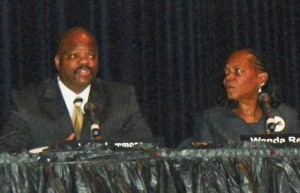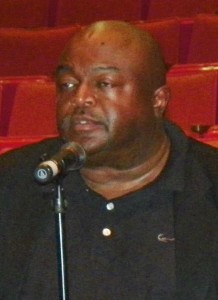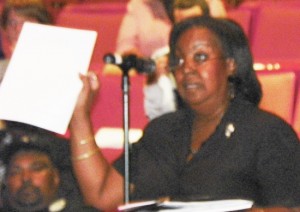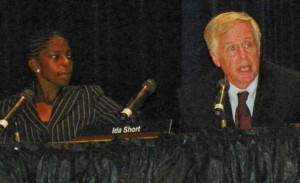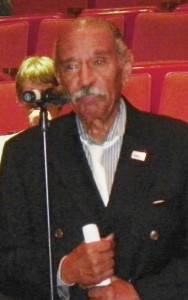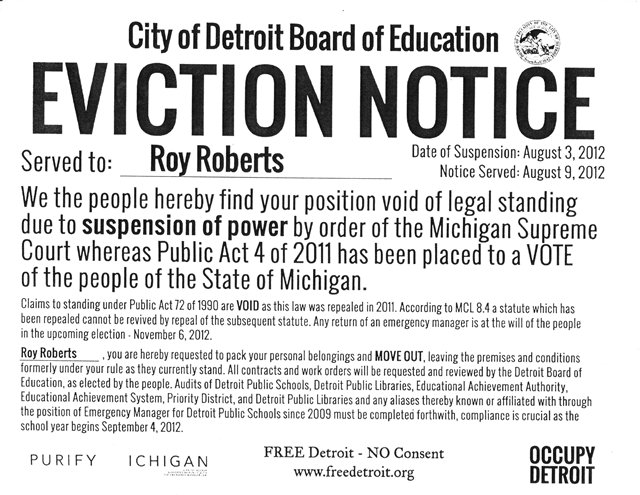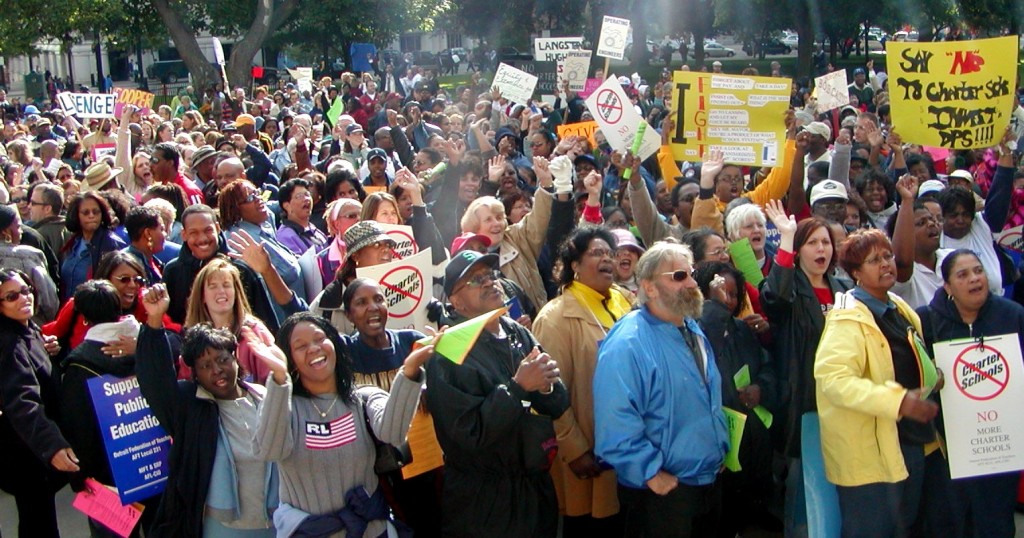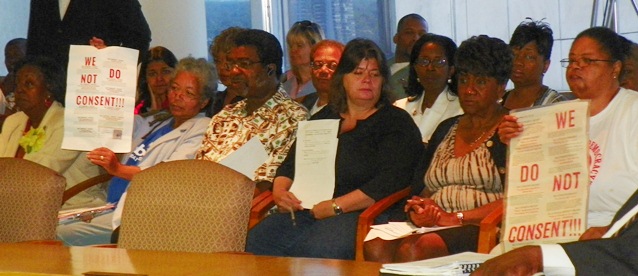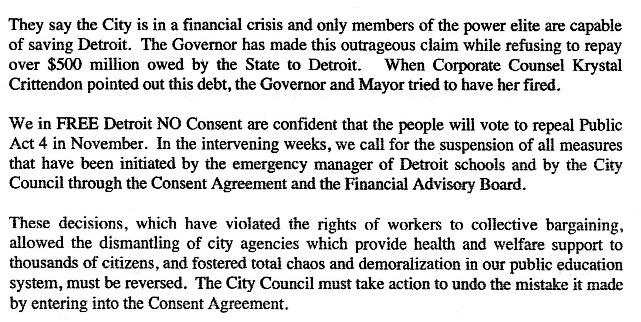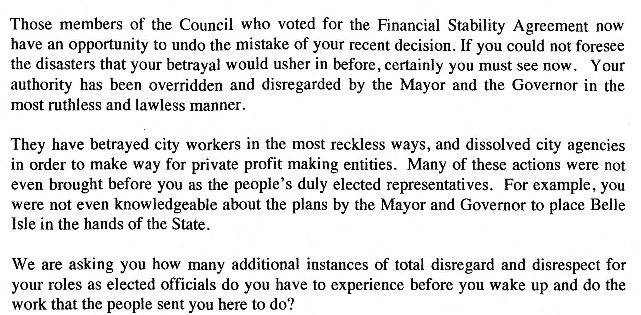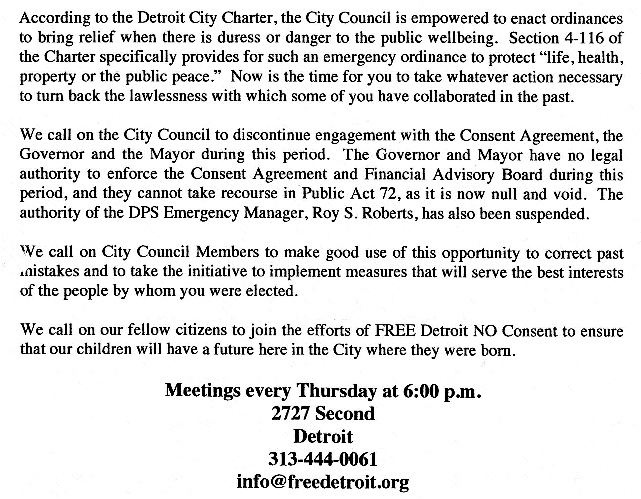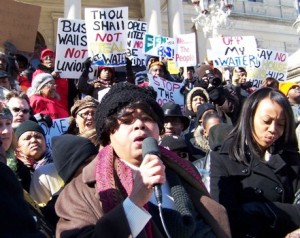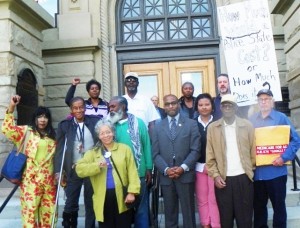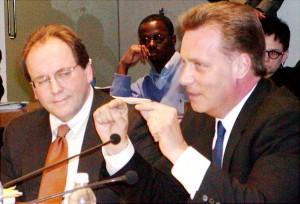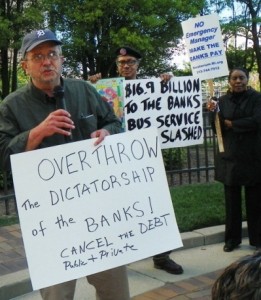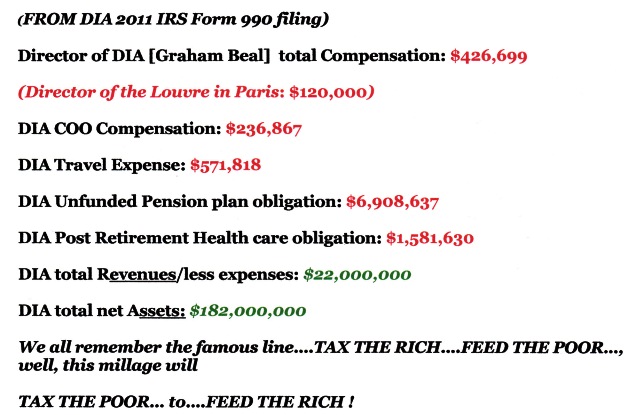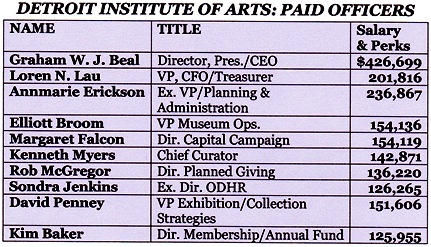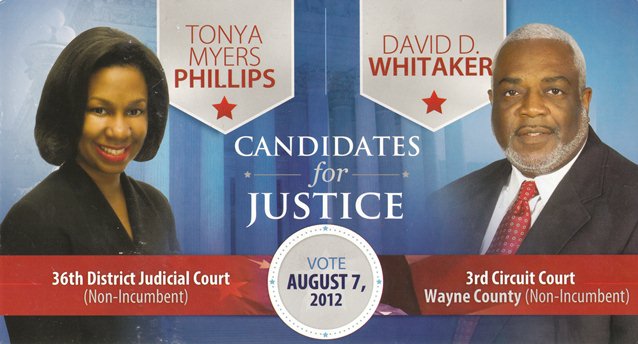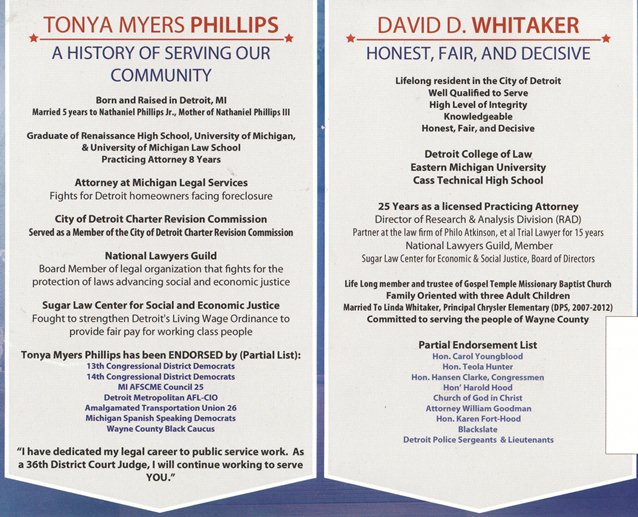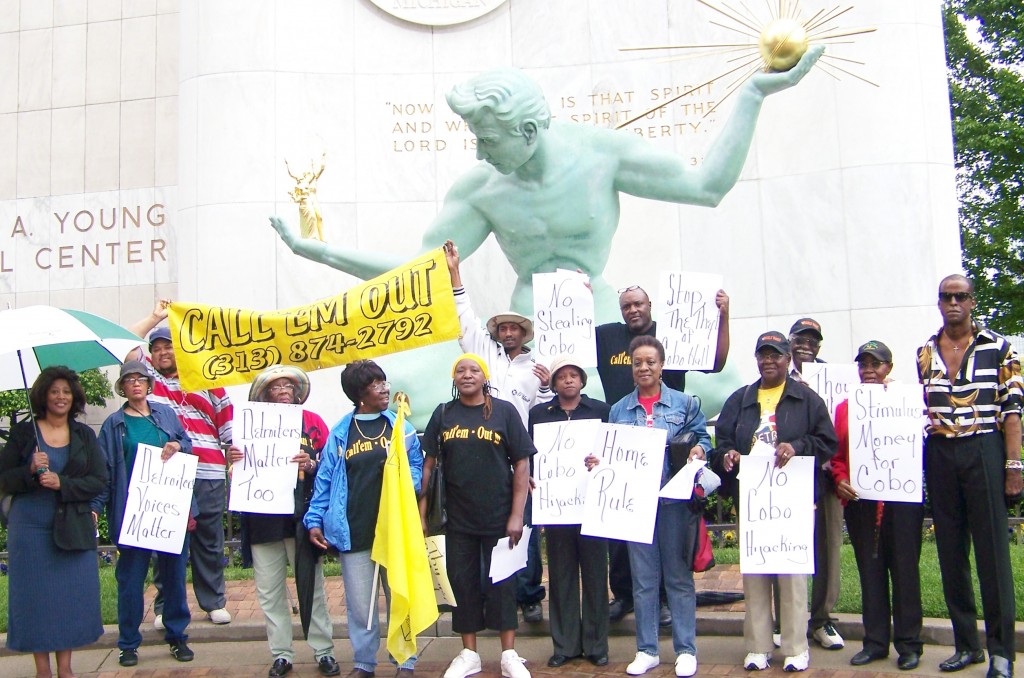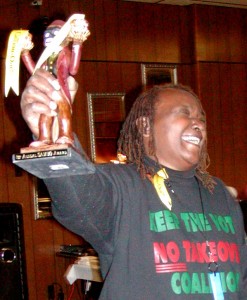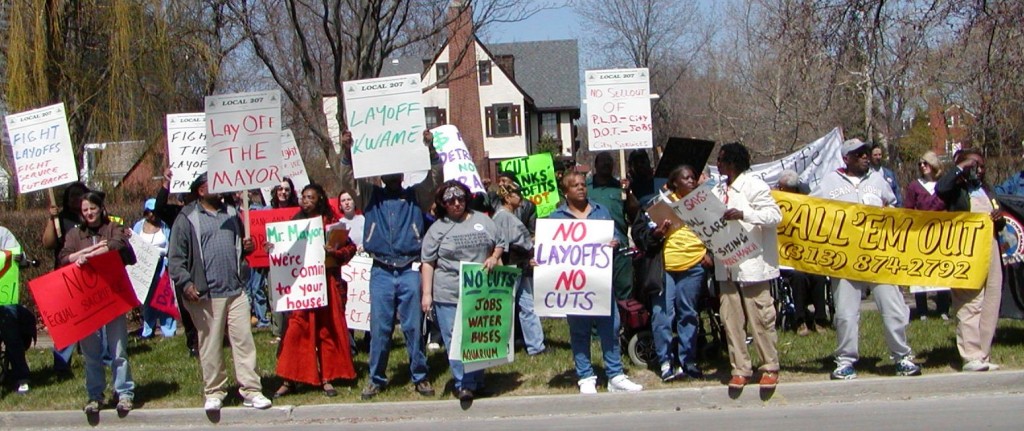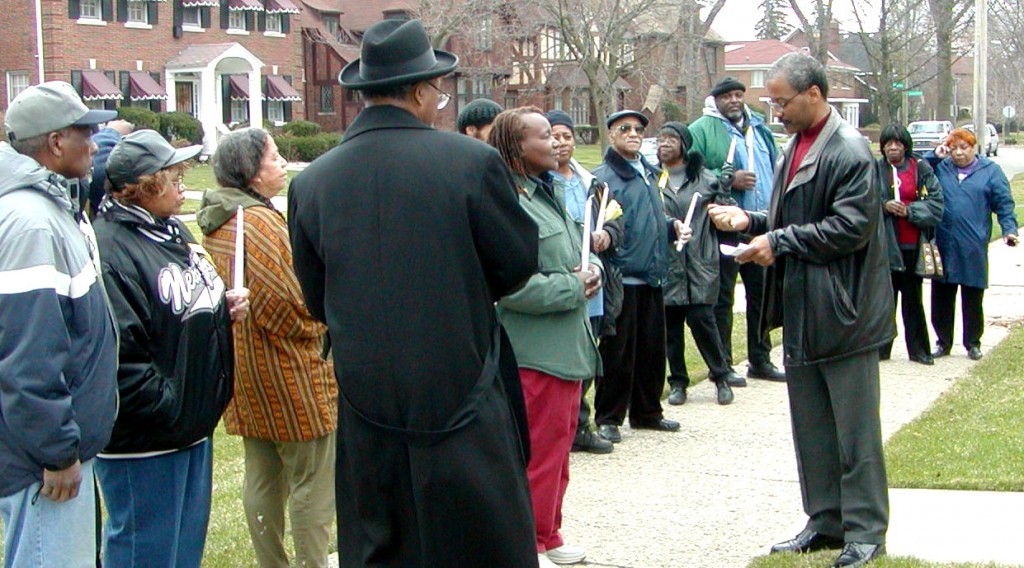
During session on possible theft of federal funds, city and state officials are grilled by Council members. They are (l to r) MDCH executive Jean Chabut, city finance director Cheryl Johnson, city COO Chris Brown, and (far right) Health Department director/IPH CEO Loretta Davis.
Council grills Workforce and Health Dept. officials re: auditor’s reports
By Diane Bukowski
August 9, 2012
DETROIT – The Detroit City Council unanimously called on the Law Department and the city’s incoming Inspector General to investigate the transfer of federal funds from the city’s Departments of Workforce Development (DWDD) and Health and Wellness Promotion (DHWP) to private accounts. During a special session Aug. 7, they asked for all actions necessary, civil and criminal, to be taken after the investigation concludes.
The status of the two departments, which the Bing administration had planned to turn over to private agencies, is unclear now that Public Act 4 is on the ballot. Bing used the city’s PA 4 consent agreement in his unilateral transfer.

- (L to r) Former DWDD director Pamela Moore, now DESC CEO, DESC board chair David Baker Lewis, COO Chris Brown, and state officials listen to Councilwoman Brenda Jones’ questions.
Council members grilled DWDD director Pamela Moore, DHWP Director Loretta Davis, the city’s chief operating officer Chris Brown, Finance Director Cheryl Johnson, and other officials about fund transfers to Detroit Employment Solutions Corporation (DESC) and the Institute for Population Health (IPH), private companies not yet certified as non-profits by the IRS.
Moore now holds the title of CEO of DESC, while Davis occupies two positions as DHWP Director and as CEO of IPH. DWDD workers and contractors have been laid-off, while DHWP workers are to be laid off Sept. 28.
Moore, Davis, Brown and state officials all claimed no conflict of interest exists in the situation.
Council legal consultants have said the Charter requires the Mayor to submit an Executive Re-Organization Plan for approval by Council before any shutdowns and/or transfers of departments. Council members said Aug. 7 that they had received no such plan.
Detroit Employment Solutions Corporation

- City Councilwoman JoAnn Watson at session Aug. 7, 2012
“I want the Auditor General, Fiscal Analyst, Law Department and Budget to place a hold on these City of Detroit accounts,” Councilwoman JoAnn Watson said. “It is not lawful for one individual to go down to First Independence Bank and withdraw funds from a city account using one signature, and then place them in another account at Comerica Bank for private use.”
“The grant recipient is the City of Detroit,” Councilwoman Brenda Jones said. “That means the City of Detroit is financially responsible and accountable for the management of those funds. The Council had to approve these grants. Nobody can say this body is going to be responsible for $48 million transferred under the same board by the same director who worked at DWDD. There are going to be fireworks!”
City Council Fiscal Analyst Irvin Corley concurred with Jones’ allegations.
Brown said some of the funds have since been returned to city accounts. He, DWDD Board Director David Baker Lewis, and state officials contended that the DWDD is being dismantled and its workers laid off due to irregularities discovered in audits beginning in 2002, including $5.5 million in funding disallowed by the federal government.
They did not produce supporting documentation.
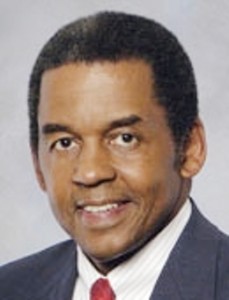
- David Baker Lewis in earlier years. Photo: Crains Detroit Business.
Moore changed the name of the private organization to DESC on June 29, 2012 according to state documents. Those documents trace the organization back to 1984, when it was founded by Lewis as “The Detroit Private Industry Council’’ (DPIC). He has now come full circle to chair the board of the DESC.
The DPIC was to receive grants from the state and other public and private sources “to prepare youth and unskilled adults for entry into the labor force” under the federal Job Training Partnership Act. Its history was subsequently intertwined with that of the City of Detroit Employment and Training Department, which paid fees for later filings with the state.
Through the 1990’s, Employment and Training was privatized piecemeal. Directors replaced city workers with various non-profit providers, according to documents from the Coalition to Stop Privatization and Save Our City. Click on CSPSOC to read whole flier. Excerpt is below.

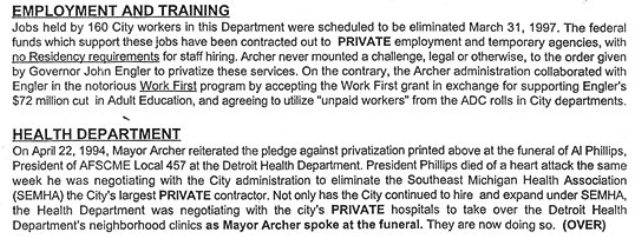
In 1997, the DPIC became “The Detroit Workforce Development Board.” In 1998, Willie Walker, then director of E&TD, became the resident agent and sole officer of the board. In 2005, Cylenthia LaToye Obayan, a subsequent department E&TD director, joined the board.

- Former DWDD director, now DESC CEO, Pamela Moore at Council Aug. 7, 2012.
On Dec. 9, 2011, the name was changed to the “Detroit Workforce Development Board Corporation.” On June 29, 2012, Moore as resident agent changed its name to Detroit Employment Solutions Inc.”
(Click on DESC DWDD state docs to view state documents.)
Guidestar, to which the IRS provides annual 990 tax filings for non-profits, says the Detroit Workforce Development Board is not currently registered with the IRS, which was confirmed by an IRS database search.
Its last tax filing for 2009 showed it had a fund balance of $23,050, but sections for revenues and expenses were filled in with zeroes. Calvin Sharpe of the Penske Corporation was president of the board. (Click on DWDB 990 2009 to view 2009 filing.)
Moore described her purpose in establishing the DESC .

- Councilwoman Saunteel Jenkins speaks at earlier Council session as Council members Gary Brown and Charles Pugh listen. The three, along with Ken Cockrel, Jr. and James Tate, later voted for the PA 4 consent agreement.
“As President and CEO, I can be nimble and effective,” she told the Council. “Expenses will be lower. I can go out and seek public and private funding more easily.”
She also said they would no longer have to pay city wages and benefits to employees. Councilwoman Saunteel Jenkins pointed out the loss of city workers will jeopardize the stability of the city’s pension fund, and Councilwoman Watson called it “union-busting.”
Institute for Population Health, Inc.
After finishing with the DWDD group Aug. 7, City Council turned to Loretta Davis, her legal counsel, COO Chris Brown, Detroit Finance Department Director Cheryl Johnson, and Jean Chabut, Deputy Director of the Michigan Department of Human Services (seen in photo at top).
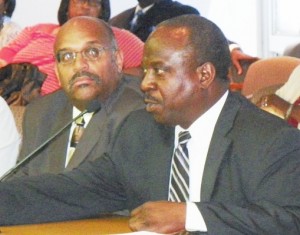
- Deputy Auditor General Mark Lockridge (r) addresses Council Aug. 7, 2012 as Council Fiscal Analyst Irvin Corley (l) listens.
The questionable dealings first came to light when city Deputy Auditor General Mark Lockridge began routine final audits of the departments Bing planned to close.
He told Council July 31 that Davis had transferred federal funding for the Department to a private account for the newly-created “Institute for Population Health, Inc.” (IPH). COO Brown said he authorized the IPH deposit.
Davis incorporated the private IPH, which has not yet been certified by the IRS as a non-profit, in May, 2012. She filed restated Articles of Incorporation on June 20, 2012. She met with Health Department workers May 31 to tell them they would be laid off and could re-apply for their jobs with the IPH, but that fewer jobs would be available.

- DHWP Deputy Director Betsy Pash and Director Loretta Davis at Council session May 16, 2012. Pash is now COO of the IPH; she worked previously at the MDCH.
Councilwoman Brenda Jones told Davis Aug. 7, “I specifically asked you where the seed money for the IPH was coming from, and you told me it was the state. “
Davis countered that she thought Jones was only referring to state grants, during a previous Council meeting May 16.
Outraged, Jones said, “Everybody keeps telling us, ‘oh well, it was a mistake.’ I’m sick of that. The citizens of Detroit are continuing to pay for your mistakes.”
(Links to earlier VOD articles on the DHWP and the IPH which detail the IPH’s origin are at end of story.)

- Herman Kiefer Health Complex. Detroiters have been coming there for years to get birth and death records, but officials said Aug. 7 they want to move that division downtown, where there is no parking.
At the hearing Aug. 7, Lockridge said Davis had deposited at least $50,080 into the IPH account with Fifth Third Bank. He reported that the funds were restored to the DHWP account after the OAG’s discovery. But he said a petty cash fund containing $1800, plus an additional $1,000 from Vital Records receipts as of July 30, has not been accounted for (click on AG DDHWP to read Lockridge’s written report which was given to Council. It also details which federally-funded divisions Davis plans to keep under the DHWP designation).
Plans for the total transfer of the department have also changed since Lockridge’s discovery.

- Photo of mother and baby at DHWP WIC clinic, from DHWP website.
Davis told Council May 16 that she planned to strip the department of $54.3 million in federal and state grant funding and $10.2 million in fee revenues, all of it to go to the IPH, lay off 400 workers, and bust the union.
On Aug. 7, Davis said, “There are four grants from the federal government to the City of Detroit that we are not asking to be moved to the IPH. DHWP will still administer those. The state has agreed to contract with the IPH for state grants.”
Davis claimed no conflict of interest is involved because she will be getting only one paycheck for working as DHWP director and IPH CEO. Lockridge’s written report shows that the DHWP plans to pay her salary and that of three other DHWP/IPH employees, using revenues from sources including Vital Records fees.

- Thomas J. Adams/Photo from company website.
Meanwhile, the IPH website at http://ipophealth.org/ still lists openings for numerous jobs that previously were occupied by City of Detroit workers, including those in federally-funded divisions such as WIC and Lead Poisoning.
Workers are to be hired through T.J. Adams Staffing Services, with a website at http://www.tj-adams.com/index_page.htm. That site says T.J. Adams is associated with a national health care-related private entity, RBJ Enterprises, LLC, with a site at http://rbjenterprises.com/company.htm.
T J. Adams says on the IPH site, “All employment is strictly on at ‘at-will’ basis. If an offer of employment is tendered, and accepted, either the employer or the employee can terminate the employment relationship at any time, with or without cause, and with or without notice. This at-will employment relationship exists regardless of any other written statements, policies, or any other documents or verbal statements to the contrary.”

- Jean Chabut
Jean Chabut, who is the Michigan Department of Community Health’s Deputy Director of Public Health Administration, and chairs the non-profit Michigan Institute for Public Health, supported Davis at the meeting.
“We have needed to work with the Detroit Health and Wellness Department on a number of organizational difficulties, including fraud in the WIC [federally funded Women, Infants, and Children] program,” Chabut said. “There have been many performance issues and we believe the IPH will permit greater efficiency.”
Again, she produced no documentation of her allegations.

- Councilman Kwame Kenyatta
“So the baby has been split up but still has the same mother,” Council member Kwame Kenyatta said sarcastically. “You could not resolve the problem without splitting the child and leaving the mother with the child? Nothing here is fraudulent or a conflict of interest, right?”
Chabut began her career with the Detroit Health Department, where she worked for 17 years and became director of its nursing division.
She, Cynthia Taueg, and Vernice Davis Anthony, who also began their careers at the city health department, all sit on the board of the IPH, with Taueg as chair.

- Vernice Davis Anthony
Chabut and Davis claimed the Health Department has always had private workers, employed by the Southeastern Michigan Health Authority (SEMHA). However, according to AFSCME Local 457 officials, when Chabut began work there, there was no SEMHA. They said they have fought the intr0duction of SEMHA and privately-contracted workers from the 1980’s to the present date.

Cynthia Taueg
The day before he died of a massive heart attack on April 16, 1994, Local 457 President Al Phillips met with Taueg to discuss the removal of SEMHA, after also raising the matter with Labor Relations and City Council earlier in the week.
http://voiceofdetroit.net/2012/05/21/city-wants-to-replace-health-dept-with-private-institute-for-population-health/
http://voiceofdetroit.net/2012/05/21/detroit-founded-health-dept-in-1825-it-previously-ran-3-hospitals-including-detroit-general-5-clinics-physician-home-visit-services/




